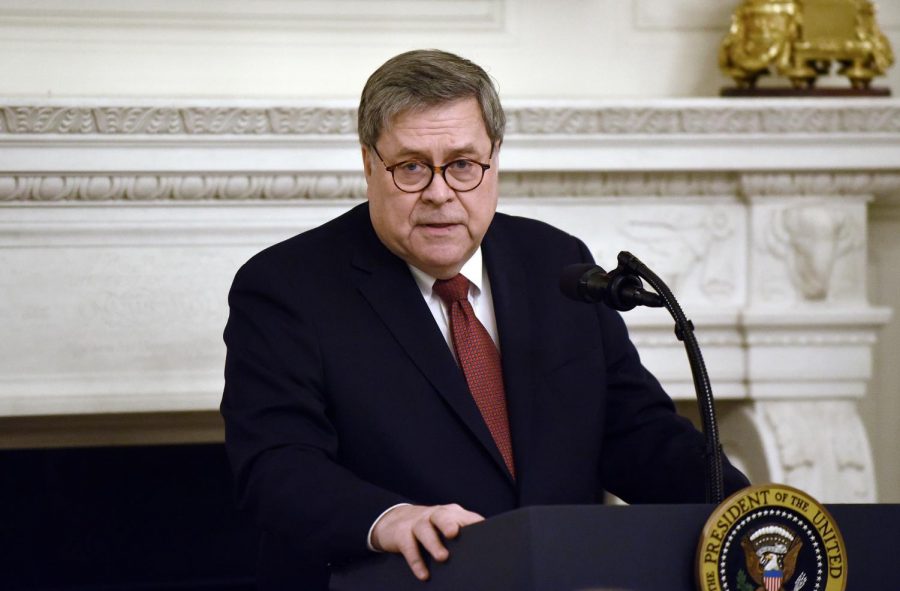How Barr found no obstruction by Trump when Mueller wouldn’t
U.S. Attorney General William Barr looks on during an event with the National Association of Attorneys General, in the State Dining Room of the White House on March 4, 2019, in Washington, D.C. (Olivier Doulier/Abaca Press/TNS)
March 25, 2019
By Chris Strohm and Shannon Pettypiece
Bloomberg News
(TNS)
WASHINGTON — Democrats look at Special Counsel Robert Mueller’s conclusion that he couldn’t “exonerate” Donald Trump on obstruction of justice charges as vindication for their continued probes of the president.
Republicans pointed to other sentences in Attorney General William Barr’s letter on Mueller’s report to claim vindication of their own, noting Barr found there wasn’t enough evidence to form an obstruction case.
How can one report lead to two such different conclusions? The simple answer is, Barr did something no one expected him to do, or at least not so quickly, and that was pass judgment on some of Mueller’s findings in a letter sent to Congress on Sunday.
And he did so in the space of less than 48 hours after first announcing he’d received Mueller’s report on March 22.
Now Democrats are crying foul, with the head of the House Judiciary Committee, Jerrold Nadler, already calling for Barr to come before his committee to explain himself. Nadler and others say it’s Congress’ prerogative to determine if the president broke the law on obstruction, not the attorney general — a Republican appointed by Trump.
Nadler made clear he plans to pursue his own probe into obstruction, something that could become part of a debate among Democrats about whether to impeach the president.
Barr had promised a quick readout on the “principal conclusions” of Mueller’s work after the special counsel turned in his final report on March 22. Official Washington expected a terse recitation of the top-line facts, with a fuller explanation down the road. For instance, Barr reported that Mueller found no evidence of Trump collusion with Russia with little elaboration.
But Mueller was far less decisive on obstruction — forgoing a decision on whether to prosecute the president, citing “difficult issues” of fact and law — but noting that his report “does not exonerate” the president.
Barr stepped in.
He inserted his own judgment — and that of Deputy Attorney General Rod Rosenstein — that charging Trump with obstructing justice wasn’t warranted. Barr said simply the evidence didn’t rise to the level that Trump broke the law. Barr said in his summary that most of Trump’s actions took place in public view or have been the subject of public reporting.
Barr also said that because there was no criminal activity related to collusion, it would be difficult to prove Trump had corrupt intent in his actions toward the investigation.
For months, Democrats had thought obstruction charges were warranted because of Trump’s overt moves, including firing FBI Director James Comey, his public statements of derision about Justice Department personnel, and support for former aides charged with crimes. But demonstrating Trump’s intent with those moves is a much more difficult task.
Barr doesn’t make it clear in his letter whether Mueller asked him to make a determination on obstruction. It’s also possible that Mueller believed it’s a matter that Congress should decide. Mueller’s spokesman, Peter Carr, declined to comment.
Mueller concluded his investigation into obstruction without ever asking Trump about his actions. Trump’s lawyers wagered that Mueller wouldn’t subpoena Trump for his testimony and refused to answer questions from Mueller related to obstruction, fearing that Mueller could accuse him of perjury if they were contradicted by other witnesses.
Once Barr’s summary was released, Trump quickly claimed victory, and Democrats now face an uphill battle in public opinion if they choose to take the case further than Barr’s own report says they should.
“We knew from his confirmation hearing that Attorney General Barr would never conclude the president obstructed justice, which is why it is critical for Congress to see the full Mueller report and the evidence behind it,” Democratic Sen. Sheldon Whitehouse, a Judiciary Committee member, said on Sunday in a statement.
Barr indicated in his summary that there’s material in Mueller’s report that won’t be provided to Congress or made public, likely setting up a prolonged legal battle.
———
©2019 Bloomberg News
Visit Bloomberg News at www.bloomberg.com
Distributed by Tribune Content Agency, LLC.
—————



